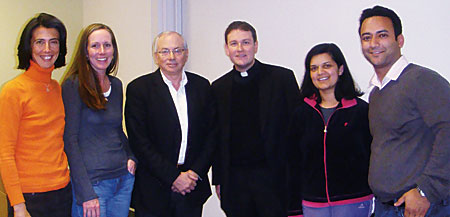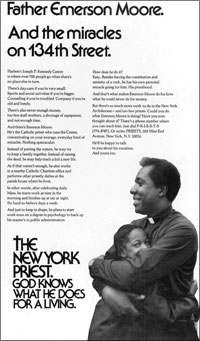

Stern senior Michael Antonucci (above right) plays bass guitar in his band, The Bride Wore Black, which recently won mtvU’s Best Music on Campus “Woodie” award (above left). |
School of Rock
By Joey Schmit
MTV awards don’t usually show up on the résumés of most graduating business students, but NYU Stern senior and bass guitarist Michael Antonucci (BS ’09) is defying the odds with his band, The Bride Wore Black, which recently took home mtvU’s Best Music on Campus “Woodie” award.
The Bride Wore Black beat out thousands of college musicians to win the award, which is given annually to the top unsigned college band in the nation – a band that is expected to break through in the coming year. “We were just excited to be nominated,” Antonucci admitted. “None of us were expecting to win, and we owe a lot of thanks to all of the fans who voted for us.”
The band, formed in 2006, also includes NYU College of Arts and Science senior Sean Walsh and two students from Five Towns College. After performing at smaller Manhattan venues, the band gradually developed a fan base through social networks such as MySpace and by touring in the tristate area.
Antonucci, who graduates this May with a double major in finance and accounting, credits his Stern education with giving him an advantage in the music business. “I wasn’t sure exactly what I wanted to do when I entered college, but always believed business would be a part of it,” Antonucci explained. “We are self-managed like many unsigned bands on the scene today, and the business concepts I’ve learned at Stern have really helped. My courses in accounting and marketing have come into play when keeping the books and with all of the viral promotions we’re doing.”
Furthermore, Antonucci developed an interest in entertainment law, which sprouted after taking Professor Richard Hendler’s business law courses at Stern. “I was really turned on to this field because it combines my business interests with my passion for music,” said Antonucci. “I can definitely see myself going to law school down the road.”
As the winner of the mtvU award, the band received a sponsored national college tour and a $5,000 cash prize, which they intend to put toward recording a new album. While the band’s future is uncertain, for now, Antonucci plans to continue touring and making music. “The award was a great step for us toward gaining success in this business. We’re going to give it our best and see where it takes us.”

Students (on left and right) in Professor Russell Winer’s (center left) marketing class heard from Father Luke Sweeney (center right) about the Archdiocese’s marketing campaign to attract new priests. |
Marketing Dogma
By Rika Nazem
Marketing Professor and Department Chair Russell Winer posed an interesting case to his Executive MBA class: Given the difficulty of recruiting Catholic priests today, devise a marketing strategy using new media to attract and recruit 18- to 22-year-old males to the profession. “This is a unique case study and a difficult marketing problem – one that we don’t typically study and something I knew my students would love to tackle,” he explained recently.

Students examined the Archdiocese’s marketing campaign from the 1970s that included ads like the above, which was rated the most effective ad of the campaign. |
Students were assigned to analyze the original Archdiocese of New York case study from the 1970s as well as the Archdiocese’s current marketing campaign. The class heard from the Archdiocese’s Father Luke Sweeney about the parish’s marketing efforts and recruiting challenges. “It was incredibly valuable to have Father Sweeney in the discussion,” said Sam Barclay (MBA ’10), and a member of the class. “It is one thing to discuss a business problem in the abstract; it’s a completely different thing to have the person who is faced with the challenge right there in the class debating the approaches to the problem.”
In addition to reading the case study and talking to Father Sweeney, students evaluated the organization’s website and assembled their own focus groups, including several young men currently attending the Naval Academy, to get a sense of what drew those applicants to make a similar type of long-term commitment and if there were differences in the decision-making process. Barbara Granata (MBA ’10), another student in the class and a marketing manager for an investment firm, explained her group’s recommendations: “We learned that the decision to become a priest usually starts early in a man’s life and is positively influenced by a religious role model. Catholic mentors are increasingly scarce, however, so we recommended they send more young priests out to visit Sunday school classes and interact personally with young people in the elementary and middle school age demographic who may not be following the traditional Catholic school education path. We also recommended they increase their Internet traffic by adding search terms to browsers that would drive more people to their existing website, and make their social networking sites more interactive while linking to as many religious/priest/ catholic community user groups as possible.”
Barclay and Granata agree that studying marketing challenges like the Archdiocese’s are critical to tie academic learning to real-world situations. Barclay noted, “A case like this is great stimulus for discussion and debate, and provides the class an opportunity to help solve a real-world business challenge.” Granata added, “One of my biggest take-aways from the class is how important it is to do market research early on to understand your target market and define your value proposition. I was able to take back many of the tools I learned in class and implement them immediately in my role at the investment management firm. Our senior portfolio managers have now started saying for the first time, ‘What’s our value proposition?’ when we discuss marketing approaches to different client segments. It is hugely gratifying.”


![]()